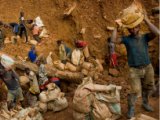A coalition of 59 non-governmental organisations (NGOs) is calling on the European Commission to pass a strong law to prevent European businesses fuelling conflict and human rights abuses through their purchases of natural resources, such as tin, gold and diamonds. The call comes ahead of draft legislation due to be published by the Commission by the end of 2013.
Breaking the Links Between Natural Resources and Conflict: The Case for EU Regulation, published today, sets out the key elements that must be included in EU legislation to compel European businesses to carry out thorough supply chain checks, known as due diligence. The checks allow companies to make sure they are not using or trading natural resources that are funding violence.
“For decades the trade in minerals, precious stones and other commodities has played a central role in funding and fuelling some of the world’s most brutal conflicts”, said Sophia Pickles of Global Witness. “The research we’re publishing today demonstrates that this is still a daily reality for people in resource-rich countries around the globe like Democratic Republic of Congo, Colombia, Burma, Zimbabwe and the Central African Republic, where violence is a major obstacle to development.”
“As the world’s largest trading bloc, and home to many leading global companies trading and manufacturing natural resources, the EU’s leverage over global supply chains is hugely significant,” said Chantal Daniels of Christian Aid. “This is an unmissable opportunity for the EU to bring in strong and effective legislation. If they fail to do so then business will continue as usual and most companies will not check whether their purchases have funded conflict,” added Zobel Behalal of CCFD-Terre Solidaire.
The NGO coalition is calling for the EU to build on momentum generated by initiatives like the US Dodd Frank Act’s conflict minerals provision, and require EU-based companies to carry out supply chain checks that meet international due diligence standards developed by the Organisation for Economic Cooperation and Development (OECD). EU Member States have already endorsed the OECD Guidance and the framework forms the basis for several industry responsible sourcing initiatives globally.
The coalition recommends that the draft EU legislation:
Applies to all natural resources originating in any conflict-affected and high-risk area;
Is based on relevant international instruments, including the International Bill of Human Rights, the UN Guiding Principles on Business and Human Rights and the OECD Due Diligence Guidance for Conflict-Affected and High-Risk Areas;
Takes a risk-based approach that considers impacts on individuals and communities;
Complements existing EU initiatives and legislation to promote transparency and sustainable development and forms part of a comprehensive approach to prevent environmental destruction, reinforce governance and encourage security sector and mining reform in natural resource-rich developing countries.
“Doing due diligence is beneficial for European business, not least because it helps companies manage brand risk and make sure they’re not paying for war,” said Marianne Moor of IKV Pax Christi. “Properly implemented, an EU law would allow trade to take place but not at the cost of gross human rights abuses.”
Full text of the position paper (pdf): English French
The signatories to the position paper are:
1. Acidi Congo (South Kivu), DRC;
2. Action des Chrétiens Activistes des Droits de l’Homme à Shabunda, DRC (ACADHOSHA);
3. Action Aid, Netherlands; Africa Faith and Justice Network, US;
4. Africa Faith and Justice Network;
5. African Socialist International;
6. Amnesty International;
7. Action pour la Promotion et la Défense des Droits des Personnes Défavorisées, DRC (APRODEPED);
8. Association pour le Développement des Initiatives Paysannes, DRC (ASSODIP);
9. Belgian Network Natural Resources (BNNR-RBRN);
10. Bureau d’Etudes, d’observation et de coordination pour le Développement du territoire de Walikale (BEDEWA), DRC;
11. Burma Environmental Working Group;
12. CCFD Terre-Solidaire, France;
13. Centre for Research and Investigation into the Environment, Democracy and Human Rights, DRC (CREDDHO);
14. Centre for Research on Multinational Corporations, Netherlands (SOMO);
15. Centre National d’Appui au Développement et à la Participation Populaire (CENADEP);
16. Center for Trade Union and Human Rights, Philippines (CTUH);
17. Centre de Recherche sur les Ressources Naturelles (CRRN);
18. Christian Aid;
19. Coopération Internationale pour le Développement et la Solidarité (CIDSE);
20. Commission on Natural Resources of the DRC Bishops’ Conference (CERN);
21. Congo Calling, UK;
22. Earthworks, US;
23. European Coalition for Corporate Justice (ECCJ);
24. Enough Project, US;
25. Fair Trade Centre, Sweden;
26. Finnwatch, Finland;
27. Forum InformatikerInnen für Frieden und gesellschaftliche Verantwortung e.V. (FIfF), Germany;
28. Free the Slaves, US;
29. Germanwatch;
30. Global Witness;
31. Good Electronics;
32. Green IT, France;
33. Institute for Community & Adolescent Resiliency, US;
34. IKV Pax Christi, the Netherlands;
35. India Committee of the Netherlands (ICN);
36. Info Birmanie;
37. International Crisis Group;
38. Investors Against Genocide;
39. Jesuit European Social Center;
40. Justice & Paix;
41. Jewish World Watch (JWW);
42. Kachin Development Networking Group, Burma (KDWG);
43. Kaisampalad, Inc.;
44. Karen Environmental and Social Action Network, Burma (KESAN);
45. Mark Taylor, Senior Researcher, FAFO Institute for Applied International Studies Oslo, Norway;
46. Pa-Oh Youth Organisation, Burma (PYO);
47. Partnership Africa Canada, Canada (PAC);
48. Le Réseau européen pour l’Afrique Centrale (EURAC);
49. Save Act Mine, DRC;
50. Save the Congo, UK;
51. Shan Sapawa, Burma;
52. Shwe Gas Movement, Burma;
53. Students and Scholars Against Corporate Misbehaviour (SACOM), China;
54. S.dwind, Austria;
55. Swedwatch, Sweden;
56. Swisspeace;
57. Voder, DRC;
58. Workers Assistance Center, Inc., Philippines;
59. Zimbabwe Environmental Law Association.


